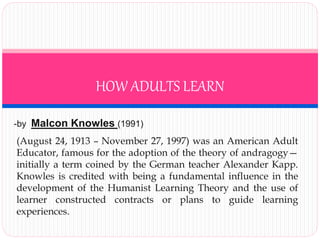
How adults learn
- 1. HOW ADULTS LEARN -by Malcon Knowles (1991) (August 24, 1913 – November 27, 1997) was an American Adult Educator, famous for the adoption of the theory of andragogy— initially a term coined by the German teacher Alexander Kapp. Knowles is credited with being a fundamental influence in the development of the Humanist Learning Theory and the use of learner constructed contracts or plans to guide learning experiences.
- 2. CHARACTERISTICS OF ADULT LEARNERS 1. Adults are autonomous and self-directed •They need to be free to direct themselves. •Their teachers must actively involved adult in the learning process and serve as facilitators for them.
- 3. 2. Adults have accumulated a foundation of life experience and knowledge •They need to connect learning to the knowledge/ experience based.
- 4. 3. Adults are goal-oriented •“They think twice before they explode”
- 5. 4. Adults are relevancy-oriented •They must see a reason for learning something. •Learning has to be applicable to their work or other responsibilities to be of value of them.
- 6. 5. Adult are practical •They focus on the aspects of a lesson most useful to them in their work. •They may not be interested in knowledge for its own sake.
- 7. 6. Adults need to be shown respect •Adults should be treated as equals in experience and knowledge and allowed to voice their opinions freely in class.
- 8. Adult Learning and Motivation
- 9. Factors that serve as sources of adult’s motivation in learning • Social relationship -to make new friends, to meet a need for associations and friendships. • External expectations - to comply with instructions from someone else. - To fulfill the expectations or recommendations of someone with formal authority.
- 10. • Social welfare - to improve ability to serve mankind, prepare for service to the community and improve the ability to participate in community work. • Personal advancement - to achieve higher status in a job, secure professional advancement, and stay abreast of competitors.
- 11. • Escape/ Stimulation - to relieve boredom, provide a break in routine of home or work, and provide a contrast to other exacting details of life. •Cognitive interest - to learn for the sake of learning, seek knowledge for its own sake, and to satisfy an inquiring mind.
- 12. THANK YOU…